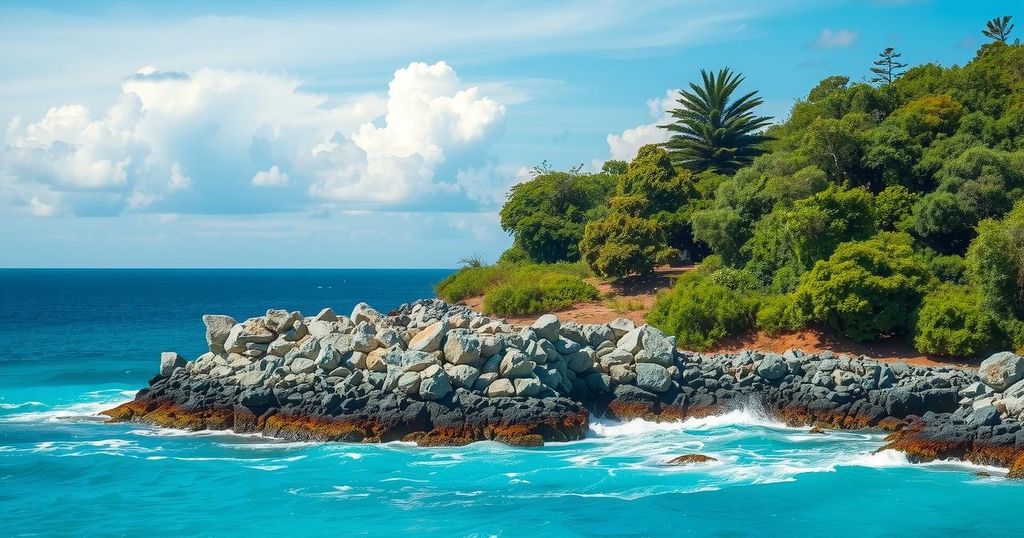Climate Change Crisis: Serua Island’s Fight for Survival
Serua Island in Fiji is under severe threat from climate change, with rising sea levels impacting the community and challenging their cultural heritage. Local leaders express concerns over government responses and advocate for more effective solutions. Despite difficulties, the community remains determined to preserve their island and identity against these pressing challenges.
Climate change is often described as the defining issue of our age, and recent developments have only amplified its urgency. Since the Paris Agreement was adopted in 2015, global dynamics have shifted significantly. The United States, once a leading figure in advocating for environmental policies, now finds itself retreating under President Trump’s isolationist stance. As a result, crucial matters, including climate change, seem overshadowed by tariffs and geopolitical conflicts such as the wars in Gaza and Ukraine.
Here in Fiji, the people of Serua Island are feeling the immediate impacts of this global phenomenon. Just off Viti Levu’s coast, rising sea levels threaten their homes and way of life. Serua has long been the chief’s stronghold for the region, but increasingly severe weather patterns and encroaching seawater are putting its cultural significance at risk.
A recent visit from The Sunday Times provided insight into the challenges faced by the residents. Led by village elder Waisale Natuna, a former village headman, our team saw firsthand how climate change is reshaping this local landscape. Traditionally, the shoreline was a short walk from the village, but today that journey has changed completely. “Today, the island is home to just over 100 households. Most of our kin now reside on the mainland in the village of Talenaua,” Natuna explained.
In recounting the history of climate calamities impacting Serua, Natuna highlighted a particularly disastrous cyclone in the 1980s that caused immense flooding even in places previously deemed safe. This catastrophe was a wake-up call for the community and signaled the need for urgent, proactive measures against climate threats.
The government had initially responded with a seawall, built in the ’80s, on the village’s western side. However, Joseva Robanakadavu, spokesman for the Vunivalu, raised concerns about the seawall’s effectiveness. He noted, “The wall has no outlets to allow rainwater to flow back into the sea during heavy downpours. Because of this, water builds up in the village, forming puddles that slowly seep into the ground. Over time, this causes the soil to sink, making the land unstable.”
The island features two significant hills, Navua and Dakuiserua. The latter is of sacred importance, housing graves of the island’s paramount leaders, and recent heavy rains have led to alarming landslides on both hills, worsened by rising tidal waters. Natuna’s proposed solution involves planting vetiver grass around Dakuiserua to stabilize the soil.
A more comprehensive solution is desperately needed, as the eastern half of the island suffers from a lack of proper barriers against rising seas. “The previous government’s temporary measures are insufficient; we require an engineered seawall, not just rocks along the shore,” Natuna insisted. Village elders emphasize that stabilizing and upgrading existing structures, along with developing effective drainage systems, is crucial.
Past efforts under the Integrated Village Development Plan showcased the community’s initiative—two significant proposals included raising the island above sea level and building a reliable seawall. Despite being only a short boat ride or walk from the mainland, relocation is considered out of the question.
“There is so much history tied to this island—our identity, bloodlines, and connection to the land and sea. Words cannot capture it. This is not just the home of our paramount chief. This land symbolises who we are as the people of Serua,” Natuna passionately stated. He emphasized that while they have made appeals for assistance, they will rely on their resolve and resourcefulness to safeguard their island against the ongoing threats from climate change.
Climate change presents an existential threat to the people of Serua Island in Fiji. As sea levels rise and weather patterns worsen, the indigenous community grapples with how to protect their cultural heritage and the land itself. The response from government initiatives has been deemed inadequate by local leaders, who are determined to take matters into their own hands, stressing the profound connection between their identity and their island.
Original Source: www.fijitimes.com.fj




Post Comment